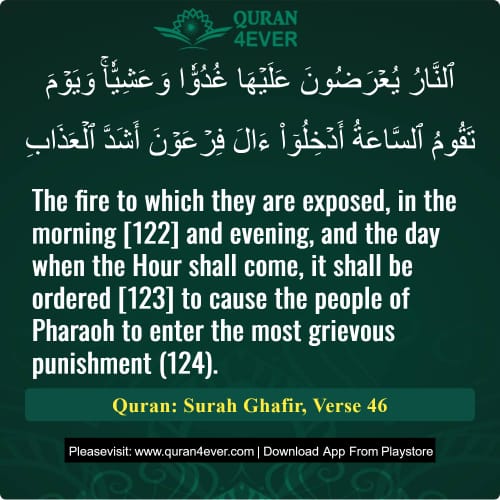
Transliteration:( An Naaru yu'radoona 'alaihaa ghuduwwanw wa 'ashiyyanw wa Yawma taqoomus Saa'aatu adkhilooo Aala Fir'awna ashaddal 'azaab )
"The fire to which they are exposed, in the morning [122] and evening, and the day when the Hour shall come, it shall be ordered [123] to cause the people of Pharaoh to enter the most grievous punishment (124)."
The verse clearly affirms that the people of Pharaoh are exposed to the fire even before the Day of Judgment—morning and evening, continuously. This is interpreted as the punishment of Barzakh (life in the grave), where the heat of Hell is made to reach them, not by entering Hell itself, but by feeling its torment remotely.
From this arise three points:
The punishment of the grave is a real and definite matter.
This punishment is not direct entry into Hell, but a preview experienced by sensing its heat.
In the grave, only matters of belief are judged, whereas in the Hereafter, both belief and deeds are evaluated.
Hence, this daily exposure is a prelude to the final punishment that awaits after resurrection.
When the Hour is established, it will be formally declared by angels to cast the people of Pharaoh into Hell. This open command signifies the transition from Barzakh to the final, eternal punishment.
The phrase "most grievous punishment" teaches that Hell’s punishment is not the same for all disbelievers. The most defiant and arrogant disbelievers, like Pharaoh, will face the severest torment, while lesser disbelievers may face lighter degrees—though all remain in eternal punishment.
The tafsir of Surah Muminun verse 46 by Ibn Kathir is unavailable here.
Please refer to Surah Muminun ayat 41 which provides the complete commentary from verse 41 through 46.
(40:46) They are exposed to the Fire every morning and evening; and when the Last Hour will come to pass, a command shall be given: “Admit the Pharaonites to an even more severe chastisement.”[63]
63. This verse is an express proof of the torment of barzakh, which has often been mentioned in the traditions as the torment of the grave. Allah here has in clear words mentioned two stages of the torment, a lesser torment, which is being given now to Pharaoh and his people before the coming of Resurrection, and it is, this that they are presented before the fire of Hell morning and evening, which strikes terror in their hearts and they see the Hell which they will have to enter ultimately. After this when Resurrection comes, they will be given the real and greater punishment which is destined for them, i.e. they will be hurled into the same Hell, which they are being made to witness since the time they were drowned till today, and will continue to witness it till the Hour of Resurrection. And such a treatment is not especially meant for Pharaoh and his people. All the culprits continue to witness the evil end, from the hour of death till Resurrection, which is awaiting them. On the other hand, the righteous people are made to see continually the pleasant picture of the good end, which Allah has gotten ready for them. A tradition has been related in Bukhari, Muslim, and Musnad Ahmad on the authority of Abdullah bin Umar, saying that the Prophet (peace be upon him) said: Whoever from among you dies is shown his final resting place morning and evening continually, whether he be a dweller of Paradise or of Hell. It is said to him: This is the place which you will enter when Allah will raise you back to life on the Day of Resurrection and will call you into His presence. For further details, see (Surah Al-Anfaal, Ayat 50-51); (Surah An-Nahl, Ayat 28-32); (Surah Al-Mominoon, Ayat 99-100) and the E.Ns thereof, and (Surah YaSeen, ayat 26-27) note 22,23.
[1374]- From the time of their death until the Day of Resurrection, when they will be driven into it.

For a faster and smoother experience,
install our mobile app now.
Related Ayat(Verses)/Topics